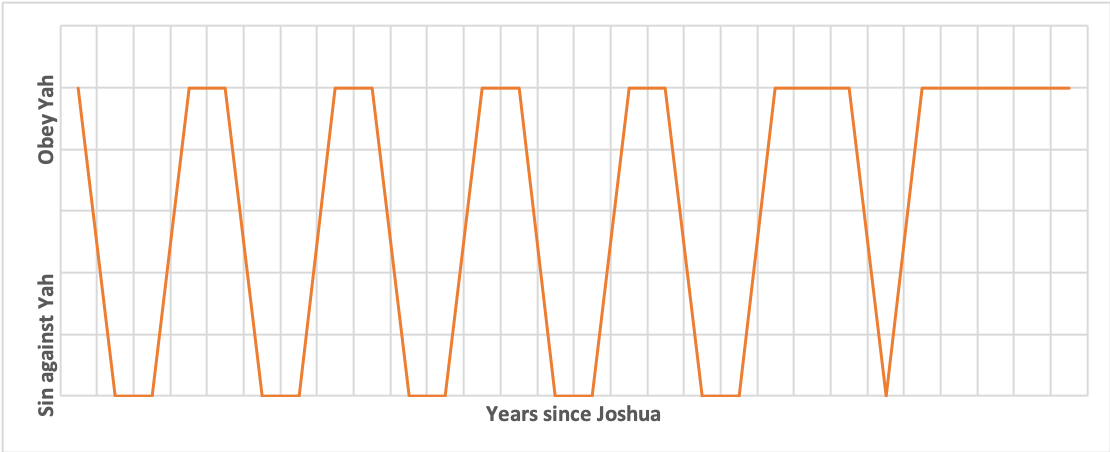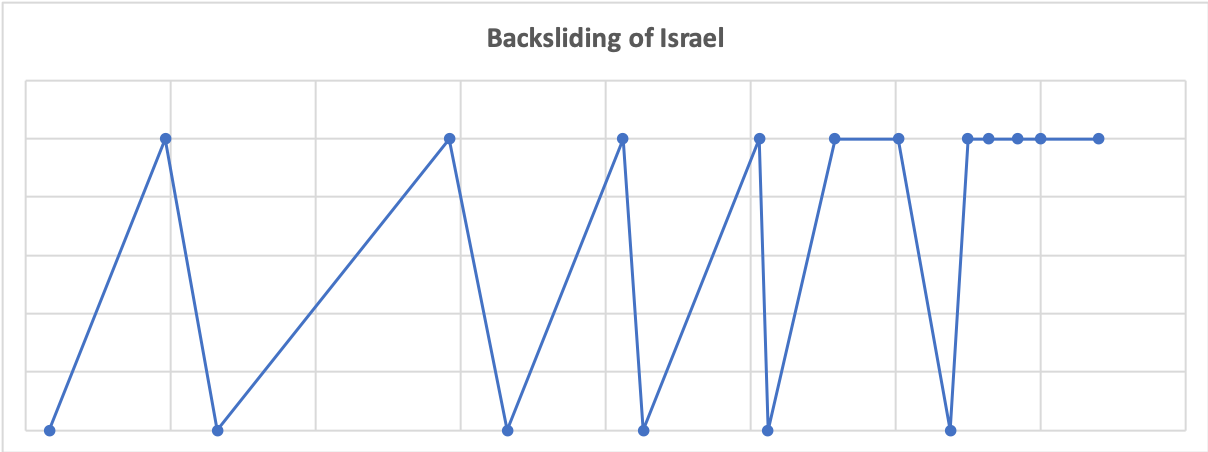The version used is KJV
Context of Judges
In order to get the specific timing of when the details of this book might have occured, we look at the book of Judges, for some clues.
| Judge | Years | Verse |
|---|---|---|
| Joshua | 25 Rahab introduced here | Jud2:8 |
| Othniel | 40 | Jud3:11 |
| Ehud | 80 | Jud3:30 |
| Deborah/Barak | 40 | Jud5:31 |
| Gideon | 40 | Jud8:28 |
| Abimelech | 3 | Jud9:22 |
| Tola | 23 | Jud10:2 |
| Jair | 22 | Jud10:3 |
| Jephthah | 6 | Jud12:7 |
| Ibzan | 6 | Jud12:8 |
| Elon | 10 | Jud12:11 |
| Abdon | 8 | Jud12:14 |
| Samson | 20 | Jud16:31 |
| Samuel | David introduced here |
| Parent | Son |
|---|---|
| Salmon with Rahab | Boaz |
| Boaz with Ruth | Obed |
| Obed | Jesse |
| Jesse | David |
Joshua lived for 110 years [Judg2:8] and if the fall of Jericho was towards the end. From the time Boaz was born to when David was born, there is a possible 120-180 years. The total Judges timeframe is around 370-400. If we assume that the judges ruled over parts of Israel during the same time, see [Judg4:3] vs [Judg4:4-5], then we can make the total years to be closer to 250 or so. This would put Boaz's birth closer to Ehud's era, as he had the longest streak for a judge. It also explains how Moab ruled Israel under Eglon [Jud3:14], which might show why Elimelech might have chosen to sojourn in Moab during the famine, which is a typical punishment at times when Israel sinned, the land suffered with the people. [Eze14:13]
The reason why this book didnt occur at any other time was due to fact that Boaz was the son of Rahab and the maximum age she might bear Boaz was 60-100, using Sarah's example. This means that she was alive for over 250 years atlest to make the timeframes work.
Also it was interesting to see how the back-sliding was happening in Israel, just few years after Joshua. Below are two ways at looking at it.

Using just the specific year to show when they cried out to Yah and obeyed, the high points vs when they went back to idols and traditions of the nations.

Famine
Famine has two Hebrew words: H7458 ra'ab famine, hunger in nation and H3720 kaphan hunger, famine, painful hunger. The word used here is H7458.
Famine is typically a judgement as called out in [Deu28:47-52], where Yah will raise up other nation to rule over Israel and Israel to serve their enemies.
And [Deu32:16-24] where the worship of idols and other gods kindles Yah's jealousy and will be punished henceforth by famine or beasts.
Here are the references where pre-Ruth, people of YHVH had sojourned away due to famine.
- [Gen12:10] Abraham sojourns in Egypt due to severe famine.
- [Gen26:1] Isaac went to Philstines when Abhimelech ruled, again due to famine
- [Gen41] talks of the great famine in Egypt and across the lands, where Joseph saves.
- [Gen46:3] Jacob takes YHVH's blessing to come to Egypt.
In all of the key famines, H7458 is used, ra'ab.
Sojourn vs Dwell
Sojourn H1481 guwr to dwell for a time vs H1961 hayah, to remain or came and continued there. This second word H1961 is to become, like in [Gen2:7] and man became a living being. This could mean that they became Moabites, becoming of Moab. Hence this would explain how and why the sons were able to take Moabite wives for themselves.
Levirate Marriage
The law from [Lev18:16] commands not to uncover the nakedness of thy brother's wife: it is thy brother's nakedness. On the exception that the brother who dwells with you dies, then [Deu25:5-10] describes the lavirite marriage
- If brethren dwell together, and one of them die, and have no child, the wife of the dead shall not marry without unto a stranger: her husband's brother shall go in unto her, and take her to him to wife, and perform the duty of an husband's brother unto her.
- And it shall be, that the firstborn which she beareth shall succeed in the name of his brother which is dead, that his name be not put out of Israel.
- And if the man like not to take his brother's wife, then let his brother's wife go up to the gate unto the elders, and say, My husband's brother refuseth to raise up unto his brother a name in Israel, he will not perform the duty of my husband's brother.
- Then the elders of his city shall call him, and speak unto him: and if he stand to it, and say, I like not to take her;
- Then shall his brother's wife come unto him in the presence of the elders, and loose his shoe from off his foot, and spit in his face, and shall answer and say, So shall it be done unto that man that will not build up his brother's house.
- And his name shall be called in Israel, The house of him that hath his shoe loosed.
This is what Naomi was referencing when in [Ruth1:11]
About Moab
Here are the references to Moab leading upto Ruth.
The word Moab comes from [Gen19:37] which means from mother's father, denoting that Moab was the son of Lot and his first daughter, following their escape when Sodom and Gomorroh was destroyed.
There are a number of places where Moab opposes Israel. It starts in [Num21] where [Num21:29] woe to Moab is pronounced. Then in [Num22] Balak, son of Zippor calls on Balaam to curse the nation of Israel. [Num25:1] start committing abomination with daughters of Moab. We learn later that this was the plan of Balaam to seduce sons of Israel.
The law is given again by Moses in the plans of Moab [Deu1:5],[Num36:13]. Moses dies in Moab and was buried there [Deu34:5-6].
We see in [Judg3:14] Israel served Eglon of Moab for 18 years.
Moab, subsequently is called the washpot over Edom of YHVH [Psa108:9, Psa60:8], compared to Sodom (while Ammon to Gomorroh) [Zeph2:9], [Isa15] and [Eze25:11] document the judgement of Moab and the people of Moab are called people of Chemosh [Num21:29] and [Jer48:46].
There is a promise in [Jer40:11] where Jews dispersed into Moab will return to the promised land.
Actions of God
- The phrase "YHVH visited" from [Ruth1:6] is used in [Exo4:31] where people heard YHVH visited sons of Israel. The word visited is H6485 paqd, which means: to attend to, muster, number, reckon, visit, punish, appoint, look after, care for.
- The phrase "hand of YHVH" in [Ruth1:13] is used in [Exo9:3], [Exo13:3], [Exo13:9], [13:14], among others. There are two words for hand. H3027 yawd, which indcates open hand, which can be used metaphorically for power and direction. While, H3709 kaph, which indicates closed hand like the palm of the hand. The use of H3027 indicates the directional and power of YHVH.
Finding rest
In [Ruth1:9] Naomi prays that Yah grant her daughter-in-law to find rest in the house of their husbands. The words used here are H4672 (matsa) for find or seek out, which is the same word used in [Gen2:20] when no one was found suitable for Adam. Rest is H4496 which means comfort, ease or being still. This is the same word in [Num10:33], [Deu12:9] but more importantly in [Psa23:2] for still waters and in [Isa11:10] His ret and [Isa32:18] a resting place.
The phrase find rest appears in [Jer6:16]- Thus saith the LORD, Stand ye in the ways, and see, and ask for the old paths, where is the good way, and walk therein, and ye shall find rest for your souls. But they said, We will not walk therein.
Which again is quoted in [Matt11:28-29] by our Messiah - Come unto me, all ye that labour and are heavy laden, and I will give you rest. Take my yoke upon you, and learn of me; for I am meek and lowly in heart: and ye shall find rest unto your souls
Hence rest as defined here, comes from God and there is permanence, calmness and comfort that comes with the rest. Its even more revelatory as we read this in the context of our Messiah, where He is our rest and we find solace and rest in Him.
Application
- Famine are judgements of YHVH. It falls on righteous and wicked alike. If there is enough warning given, like that of Joseph, we must prepare, if on the other hand, we cant prepare, then we go to where YHVH will lead us, like Abraham, Isaac or Jacob. This time of famine is to test and purify us, like the time of Job. If I trust in Yah, then I will be redeemed like the fathers of Israel.
- Like Moab was called people of Chemosh, we should be called people of YHVH
- Naomi provides a role model of how to be obedient and realize all of this is in YHVHs hands. Her trust in Yah redeems her in the end. She is also very pragmatic to ensure her daughters-in-law have a set life since they have been good to her. As she is unable to see plans of Yah, she does what any concerning mother or mother-in-law would say. She must have lived a righteouslife of example for Ruth to follow all the way back to Bethlehem and for Orpah to follow her till the country.
- We ourselves are sojourners in this land, like David stated in [Psa39:12], and Yah gives the advise through prophet Jeremiah in how to act as a sojourner in a foreign land, from [Jer29:4-7]
- Thus saith the LORD of hosts, the God of Israel, unto all that are carried away captives, whom I have caused to be carried away from Jerusalem unto Babylon;
- Build ye houses, and dwell in them; and plant gardens, and eat the fruit of them;
- Take ye wives, and beget sons and daughters; and take wives for your sons, and give your daughters to husbands, that they may bear sons and daughters; that ye may be increased there, and not diminished.
- And seek the peace of the city whither I have caused you to be carried away captives, and pray unto the LORD for it: for in the peace thereof shall ye have peace.
- To find rest, we look to our Messiah, who is our rest.